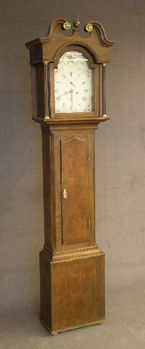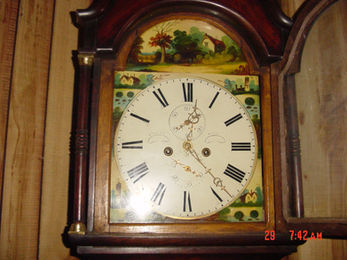Duns Clocks and Clockmakers-
A general History
The earliest surviving clock in the country and indeed in Europe is that on Salisbury Cathedral dating back to 1386 while the earliest in Scotland is St. Bride’s, Douglas dating back to the 15th. century although there are also surviving 15th century clocks at Peebles and Kirkcudbright. The early clockmakers sought to obtain recognition as a Trade without which, in the Burghs at least, they were unable carry on business and in 1721 Edinburgh was the first to admit clockmakers to membership of the Hammermen’s Guild. It was in Edinburgh that some of the finest early Bracket Clock were produced, initially under Royal Patronage and in the early stages affordable only by a few very wealthy individuals indeed it was not unknown for such clocks to be acquired by means of lottery. By the late 18th. century however production costs were falling and these became affordable by the better off working classes principally the weavers, the clocks selling at anything between £6 and £10. As a consequence business boomed and clockmakers sprung up in all market towns; and no fewer than fifteen are recorded as trading in Duns between the years 1798 and 1820. However the blast of competition was to blow in from about 1820 when the market was undercut by the mass arrival of clocks from the Black Forest area of Germany characterised by extreme simplicity and the sparing use of metal. These clocks, often sold by itinerant pedlars, were erroneously known as ‘Dutch’ a corruption of 'Deutsche' and would sell for as little as 5/-. There was a further blow to local manufacture in 1843 when John C Jerome, an American started shipping in weight drawn clocks running for 30 hours and selling so cheaply that his initial shipments were confiscated by customs and excise as they were persuaded the price was so cheap it could not be correct and that by his pricing he was attempting to evade duty. This joint assault more or less meant the death knell for local craftsmen by about 1860. Duns might appear to have been something of a centre for clockmaking and below are some of the clockmakers recorded. The late Donald Whyte produced a booklet for sale via the Scottish Genealogy Society entitled "Clock and Watch Makers of The Scottish Borders" for which we are much indebted. Below some of the clockmakers we have been able to track.
N B by double clicking on the images of the clocks below you will get a larger image and more information.
ANDERSON JOHN 1761-1802 (no personal details known)

1775 Eight day clock oak and mahogany case. height 82 inches brass arch dial. This clock was exposed for sale 2008 at £3950.

Another Anderson Clock of the same vintage. Silver face. Privately owned. Owner resides in Nottinghamshire.

The clock was exposed for sale by auction in Spring 2011 with a reserve of £1500. It is not known whether it sold.

Another splendid John Anderson Clock renovated by
East Lothian Clockmaker - Mark Baird


Internal work in progress
BRINLAW (GRINLAW) ALEXANDER; clock and watchmaker. Born Berwickshire c. 1786. Recorded as watchmaker in Dunse in 1805 when he married Agnes Haliday. 1841 recorded as watchmaker North Street, Dunse. Died before 1851. All records show the name as Grinlaw but on face of clock clearly shown as "Brinlaw".
BRINLAW ANDREW; son of the above born Duns 1807 - married Janet Scott. 1841 watchmaker in New Town Street. 1851 clock and watchmaker in Black Bull Street employing one man. Died 1865 from typhoid fever.
DAVIDSON NINIAN; Clock and Watchmaker Dunse 1798 to 1820. Born c 1767 he had been apprenticed to John Scott watchmaker in Newcastle-upon-Tyne for five years from 1783.Worked in Edinburgh 1788. Married Elizabeth Sligh, daughter of Adam Sligh, farmer Drakesmyre, Berwickshire. At least one daughter who emigrated to New Zealand. He later gave up life as a clockmaker and became a farmer at Foulden New Mains. He died there on 10th. October 1845 and is buried in the Churchyard at Foulden.
Another lovely Ninian Davidson clock in private hands and in good working order




Davidson Clock (12)
TAYLOR JAMES; clock and watchmaker Duns 1837.
WILLIAM WALDIE; clockmaker Market Place Duns c.1830-1858. Son of David Waldie staymaker and Isobel Patterson and wife of Isabella Aitchison. Died 28.1.1858 aged 67. Survived by one son and six daughters. Buried in Duns Churchyard.
SCOTT RICHARD; clockmaker Duns 1787 (recorded in Barony records as standing cautioner for one William Symington weaver Dunse).
STEWART , W clockmaker Dunse date thought to be around 1840. Possibly son of Andrew Stewart making clocks in Duns from 1780.
WALKER W; clockmaker Duns 1808
While most of the above would construct the works and mechanisms the casings would probably be made by local joiners probably particularly Dewars, joiners and cabinetmakers, 12 Murray Street. They are also recorded as having made casings for a clockmaker of the name McGregor in Ayton which were taken from Duns to Ayton by barrow.
The Society should be delighted to hear from anyone who owns or has knowledge of any Duns clocks. please use the Contact form.

































